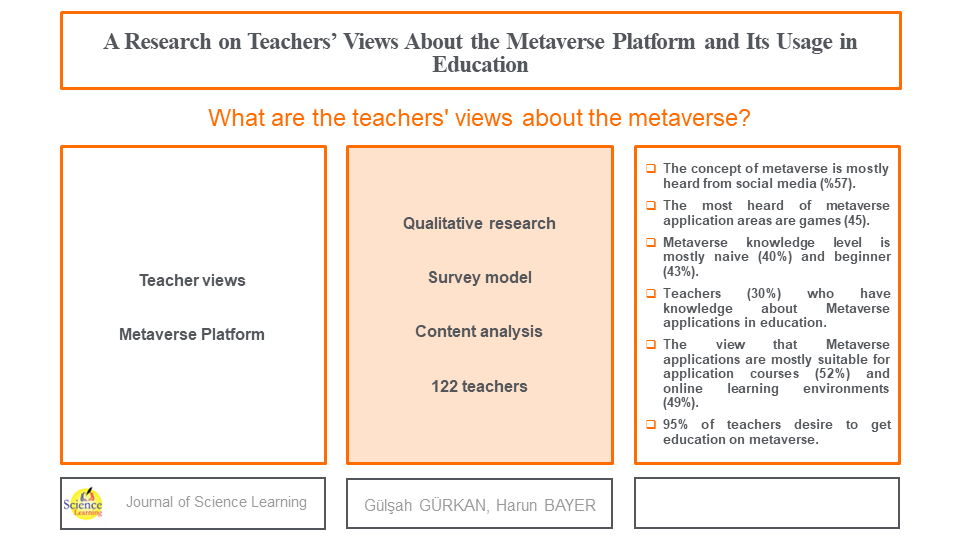
A Research on Teachers’ Views about the Metaverse Platform and Its Usage in Education
Abstract
Full Text:
Download PDFReferences
Allen K.W., (2021). Metaverse: A Beginner's Guide to The New Digital Revolution. How to Invest in Cryptocurrency, NFT, Blockchain Gaming and Other Digital Arts Of The Future.
Balcı, A. (2012). Sosyal bilimlerde araştırma (9. baskı) [Research in the social sciences (9th ed.)]. Ankara: Pegem A Yayıncılık.
Ball, M. (2021). Frameworkfor The Metaverse. https://www.matthewball.vc/all/ forwardtothemetaverseprimer. Erişim: 03.02.2022.
Berkeley University. (2020, May 16). Watch Blockeley, UC Berkeley’s online Minecraft commencement. https://news.berkeley.edu/2020/05/16/watch-blockeley-uc-berkeleys-online- minecraft-commencement/ adresinden 16.10.2022 tarihinde alınmıştır.
Bostancı, M., & Uncu, G. (2021). Metaverse: Sanal mı gerçek mi? Dijital İletişimi Anlamak-2. Palet Yayınları. PP (58-69).
Büyüköztürk, Ş. (2005). Anket geliştirme [Survey development]. Türk Eğitim Bilimleri Dergisi, 3(2), 133-151.
Carmona-Vickery, N. (2018, December). Develop Education Apps with Metaverse. https://www.medium.com/metaverseapp/develop-education-apps-with-metaverse-a40959 d8247e
Chauhan, S. (2017). A meta-analysis of the impact of technology on learning effectiveness of elementary students. Computers & Education, 105, 14-30. https://doi.org/10.1016/j.compedu. 2016.11.005
Creswell, J. W. (2013). Qualitative inquiry and research design: Choosing among five approaches (3rd ed.). Thousand Oaks, CA: Sage.
Damar, M., (2021). Metaverse ve Eğitim Teknolojisi. Eğitimde Dijitalleşme ve Yeni Yaklaşımlar. Efe Akademi.
Fraillon, J., Ainley, J., Schulz, W., Friedman, T., & Duckworth, D. (2019). IEA international computer and information literacy Study 2018 assessment framework. Amsterdam: IEA.
Gartner. (2022). Gartner: A quarter of consumers will use the metaverse daily by 2026. https://www.retaildive.com/news/gartner-a-quarter-of-consumers-will-use-the-metaverse-daily-by-2026/618474/ adresinden 15.10.2022 tarihinde alınmıştır.
Hai-Jew, S. (2010). Virtual immersive and 3D learning spaces: Emerging technologies and trends. USA: Igi Publishing.
Han, S. & Noh, Y. (2021). Analyzing Higher Education Instructors’ perception on Metaversebased education. Journal of Digital Contents Society, 22(11), 1793-1806.
Jeon, J. & Jung, S. K. (2021). Exploring the educational applicability of Metaverse-based platforms. Korea Association of Information Education. 361-368.
Kang, J. K., Cho, K. H., Kim, S. B., & Choi, N. C., (2020). Artificial Neural Network Modeling for Prediction of Dynamic Changes in Solution from Bioleaching by Indigenous Acidophilic Bacteria. Appl. Sci. 10, 7569.
Karasar, N. (2010). Bilimsel Araştırma Yöntemi (Scientific Research Method). Ankara: Nobel Yayınevi.
Koşar, D., Er, E., Kılınç, A. Ç., & Koşar, S. (2017). Öğretmen liderliğine ilişkin yapılan çalışmaların incelenmesi: Bir içerik analizi [Examining the studies on teacher leadership: A content analysis]. Inonu University Journal of the Graduate School of Education, 4(7), 33-50.
Kye, B., Han, N., Kim, E., Park, Y., & Jo, S. (2021). Educational applications of metaverse: possibilities and limitations. Journal of Educational Evaluation for Health Professions, 18.
MacCallum, K., & Parsons, D. (2019). Teacher perspectives on mobile augmented reality: The potential of metaverse for learning. In the World Conference on Mobile and Contextual Learning (pp. 21-28).
Masters, N. B., Shih, S. F., Bukoff, A., Akel, K. B., Kobayashi, L. C., Miller, A. L. & Wagner, A. L. (2020). Social distancing in response to the novel coronavirus (COVID-19) in the United States. PloS one, 15(9), e0239025. https://doi.org/10.1371/journal.pone.0239025
Mayer, R. E. (2019). Computer games in education. Annual Review of Psychology, 70. https://doi.org/10.1146/annurev-psych-010418-102744
Miles, M, B., & Huberman, A. M. (1994). Qualitative data analysis: An expanded Sourcebook. (2nd ed). Thousand Oaks, CA: Sage.
Mystakidis, S. (2022). Metaverse. Encyclopedia, 2(1), 486-497.
Park, I., Kang, H., Kim, S., & Lee, Y., (2022). Review of Intervention Studies using Metaverse in Education. Journal of Digital Contents Society. 23 (8), 1399-1412. http://dx.doi.org/10.9728/dcs.2022.23.8.1399
Park, S., & Kim, S. (2022). Identifying World Types to Deliver Gameful Experiences for Sustainable Learning in the Metaverse. Sustainability, 14(3), 1361.
Patton, M. Q. (2018). Nitel araştırma ve değerlendirme yöntemleri (3. Baskı) [Qualitative research and evaluation methods (3rd Edition)]. (Çev. Ed. M. Bütün ve S. B. Demir). Ankara: Pegem Akademi Yayıncılık.
Reis, R. Escudeiro, P., & Escudeiro, N., (2010). Comparing Social Virtual Worlds For Educational Purposes. 10th IEEE International Conference on Advanced Learning Technologies. http://dx.doi.org/10.1109/ICALT.2010.57
Sarsar, F., Başbay, M. & Başbay, A. (2015). Öğrenme-Öğretme Sürecinde Sosyal Medya Kullanımı [The Use of Social Media in the Learning-Teaching Process]. Mersin Üniversitesi Eğitim Fakültesi Dergisi, 11 (2). https://dergipark.org.tr/tr/pub/mersinefd/issue/17397/181901
Şenel, A., & Gençoğlu, S. (2003). Küreselleşen dünyada teknoloji eğitimi [Technology education in a globalizing world]. Gazi Üniversitesi Endüstriyel Sanatlar Eğitim Fakültesi Dergisi, 11(12), 45-65.
SPRI (2021). Metaverse Begins: 5 Major Issues and Forecast. IS-116.
Stegmann, K. (2020). Effekte digitalen Lernens auf den Wissens- und Kompetenzerwerb in der Schule [Effects of digital learning on the acquisition of knowledge and skills at school]. Zeitschrift für Padagogik, 2, 174-190. https://doi.org/10.3262/ZP2002174
Stephenson, N. (1992). Snow crash: A novel. New York, NY, Bantam Books
Tlili, A., Huang, R., Shehata, B., Liu, D., Zhao, J., Metwally, A. H. S., ... & Burgos, D. (2022). Is Metaverse in education a blessing or a curse: a combined content and bibliometric analysis. Smart Learning Environments, 9(1), 1-31. https://doi.org/10.1186/s40561-022-00205-x
Tokel, T. (2021, December 14). Türk araştırmacılardan okulları "metaverse" ortamına taşıyan teknoloji [Technology that brings schools to the "metaverse" environment from Turkish researchers]. https://www.aa.com.tr/tr/bilim-teknoloji/turk-arastirmacilardan-okullari-metaverse-ortamina-tasiyan-teknoloji/2446867
U.S Department of Education. (2020). Reimagining the role of technology in education. National Educational Technology Plan.
Yeşilyurt, M., Kurt, T., & Temur, A., (2004). İlköğretim Fen Laboratuarı İçin Tutum Anketi Geliştirilmesi ve Uygulanması [Developing and Implementing Attitude Questionnaire for Elementary Science Laboratory]. Pamukkale Üniversitesi Eğitim Fakültesi Dergisi, (16), 104-114.
Yeşilyurt, M., Kurt, T., & Temur, A., (2005). İlköğretim Fen Laboratuarı İçin Tutum [Attitude for Elementary Science Lab]. Pamukkale Üniversitesi Eğitim Fakültesi Dergisi, 17(17), 21-31.
Yıldırım, A. & Şimşek, H. (2018). Sosyal bilimlerde nitel araştırma yöntemleri (11. Baskı) [Qualitative research methods in the social sciences (11th Edition)]. Ankara: Seçkin Yayıncılık.
Zuckerberg, M. (2021). Founder’s Letter. Meta. https://about.fb.com/news/2021/10/found ers-letter/
DOI: https://doi.org/10.17509/jsl.v6i1.50313
Refbacks
- There are currently no refbacks.
Copyright (c) 2023 Gülşah Gürkan, Harun Bayer

This work is licensed under a Creative Commons Attribution-ShareAlike 4.0 International License.


Jl. Dr. Setiabudhi 229 Bandung 40154, West Java, Indonesia











